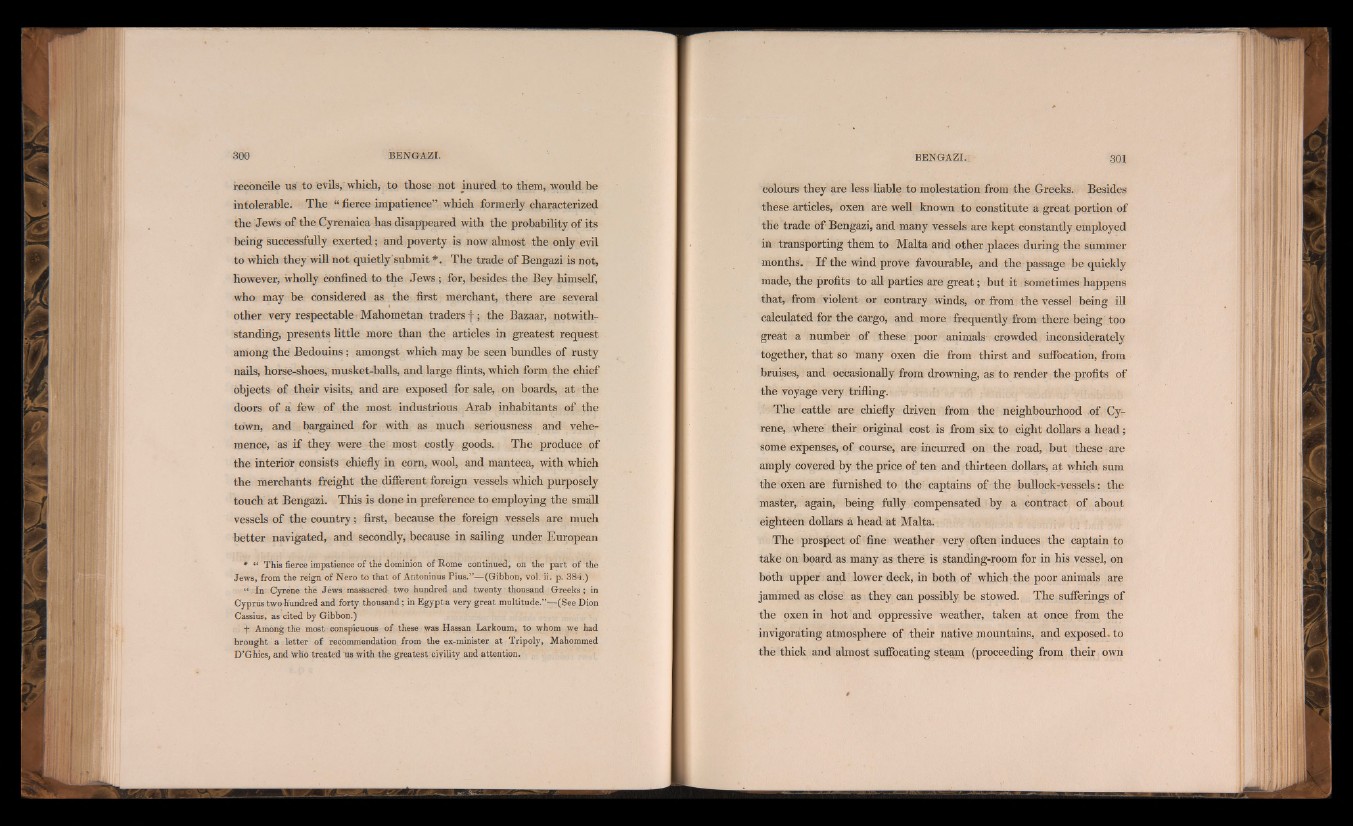
reconcile us to etils, which, to those not inured to them, would be
intolerable. The “ fierce impatience” which formerly characterized
the Jews of the Cyrenaica has disappeared with the probability of its
being successfully exerted ; and poverty is now almost the only evil
to which they will not quietly'submit *. The trade of Bengazi is not,
however, wholly confined to the Jews; for, besides the Bey himself,
who may be considered as the first merchant, there are several
other very respectable Mahometan traders f ; the Bazaar, notwithstanding,
presents little more than the articles in greatest request
among the Bedouins ; amongst which may be seen bundles of rusty
nails, horse-shoes, musket-balls, and large flints, which form the chief
objects of their visits, and are exposed for sale, on boards, at the
doors of a few of the most industrious Arab inhabitants of the
town, and bargained for with as much seriousness and vehemence,
as if they were the most costly goods. The produce of
the interior consists chiefly in com, wool, and manteca, with which
the merchants freight the different foreign vessels which purposely
touch at Bengazi. This is done in preference to employing the small
vessels of the country; first, because the foreign vessels are much
better navigated, and secondly, because in sailing under European
* “ This fierce impatience of the dominion of Rome continued, on the part of the
Jews, from the reign of Nero to that of Antoninus Pius.”—(Gibbon, vol. ii. p. 384.)
“ .In Cyrene thè Jéws massacred two hundred and twenty thousand Greeks ; in
Cyprus two hundred and forty thousand ; in Egypt a very great multitude.”—(See Dion
Cassius, as’cited by Gibbon.)
•f Among the moét conspicuous of these was Hassan Larkoum, to whom we had
brought a letter of recommendation from the ex-minister at Tripoly, Mahommed
D’Ghies, and who treated us with the greatest civility and attention.
colours they are less liable to molestation from the Greeks. Besides
these articles, oxen are well known to constitute a great portion of
the trade of Bengazi, and many vessels are kept constantly employed
in transporting them to Malta and other places during the summer
months. I f the wind prove favourable, and the passage be quickly
made, the profits to all parties are great; but it sometimes happens
that, from violent or contrary winds, or from the vessel being ill
calculated for the cargo, and more frequently from there being too
great a number of these poor animals crowded inconsiderately
together, that so many oxen die from thirst and suffocation, from
bruises, and occasionally from drowning, as to render the profits of
the voyage very trifling.
The cattle are chiefly driven from the neighbourhood of Cy-
rene, where their original cost is from six to eight dollars a head;
some expenses, of course, are incurred on the road, but these are
amply covered by the price of ten and thirteen dollars, at which sum
the oxen are furnished to the'captains of the bullock-vessels: the
master, again, being fully compensated by a contract of about
eighteen dollars a head at Malta.
The prospect of fine weather very often induces the captain to
take on board as many as there, is standing-room for in his vessel, on
both upper: and lower deck, in both of which the poor animals are
jammed as close as they can possibly be stowed. The sufferings of
the oxen in hot and oppressive weather, taken at once from the
invigorating atmosphere of their native mountains, and exposed, to
the thick and almost suffocating steam (proceeding from their own